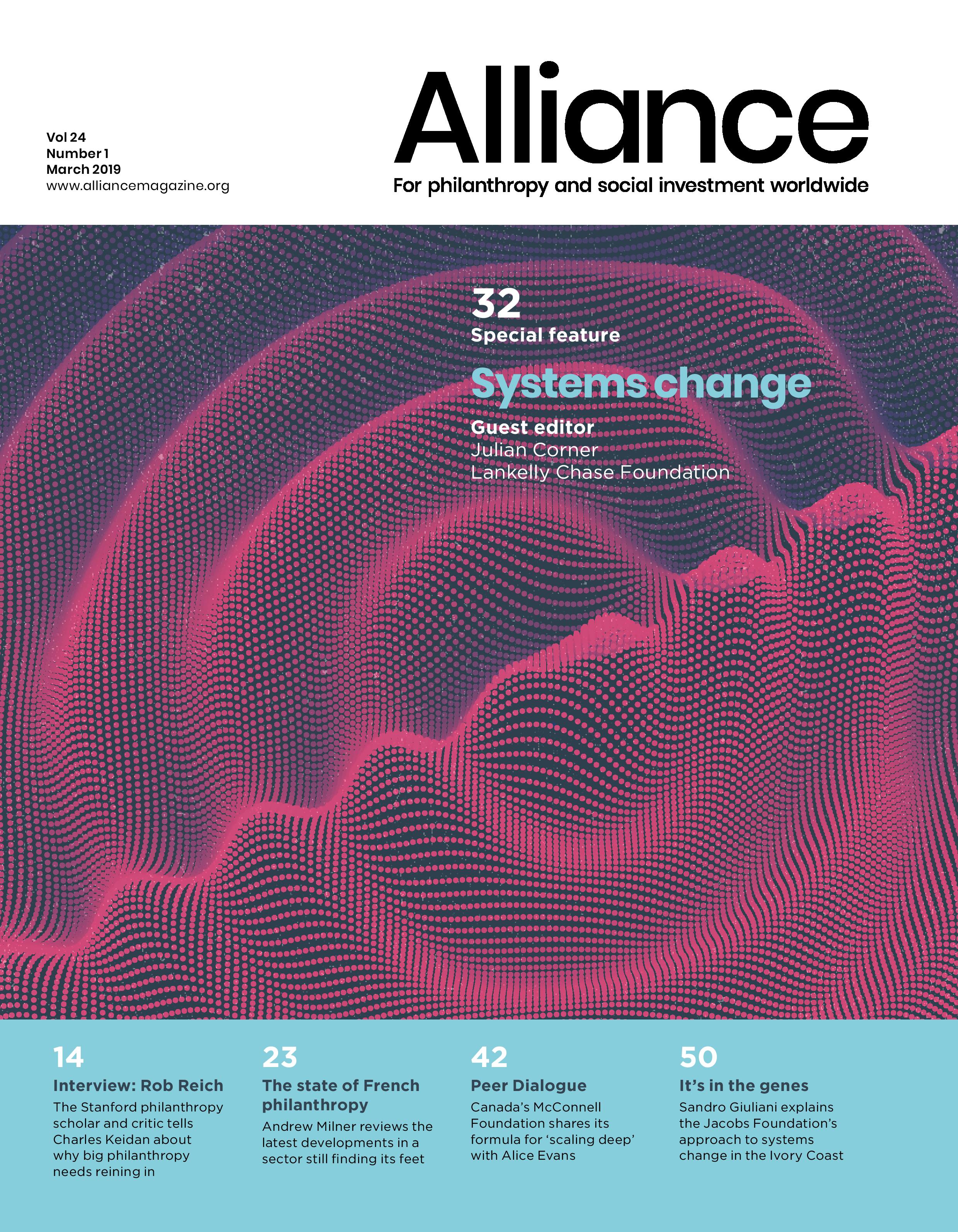 For Rob Reich, co-director of the Stanford Center on Philanthropy and Civil Society, the first question to ask about philanthropy is not how well is it doing, but what is it for? In an influential new book[1] Reich argues that major philanthropy is an exercise in power which needs reform to bring it into line with democratic standards. He tells Charles Keidan the remedy…
For Rob Reich, co-director of the Stanford Center on Philanthropy and Civil Society, the first question to ask about philanthropy is not how well is it doing, but what is it for? In an influential new book[1] Reich argues that major philanthropy is an exercise in power which needs reform to bring it into line with democratic standards. He tells Charles Keidan the remedy…
Can you outline the premise of your book for Alliance readers?
As my academic discipline is philosophy, I am trying to bring the lens of a political philosopher to the practice of philanthropy – how to think about the public policies and social norms that help to give structure to and guide the practice of philanthropic activity. The goal for me was to try to understand not just descriptively how philanthropy exists in democratic societies, but philosophically or normatively how it should support, rather than as is too frequently the case, subvert democratic ideals.
Your book also raises concerns about philanthropy’s difficult relationship with justice and equality. Why do you think philanthropy and equality are in tension?
The tension with equality is pretty straightforward. There’s the long tradition that exists in many places that charity or philanthropy is about alms giving, it’s about assistance to the poor. Yet, in almost all societies that I covered, shockingly little charity actually goes to combat disadvantage or to provide assistance to the poor. In the US – the setting I did the most empirical work in – if you make the most generous possible assumptions about what would count as giving to the disadvantaged, you get to about a third of all charitable giving.
Why is philanthropy in tension with democracy?
What we have in a democratic setting is the standing invitation to wealthy people to use their private resources to affect the public. And in many cases, that includes the effort to change public policy. It’s an exercise of power and we citizens should ensure the exercise of that power is supporting democracy rather than undermining it. And I think far too frequently, the decisions that philanthropists make tend to undermine democracy. Think of the rhetoric people use: ‘philanthropy can be smarter than the inefficient bureaucratic state’, ‘the activities of smart people in the marketplace can be transformed into social enterprises and philanthropic entities for the benefit of other people’. That’s essentially to try to by-pass democratic governance.
How do you think philanthropy should support democratic governance?
I think we need to understand what philanthropy might be able to accomplish that other sectors can’t. My answer, especially with respect to large foundations, is its ‘discovery’ function. Philanthropists can take long time horizon bets. There’s a way in which the public policies could provide a structure to allow wealthy people to direct their private assets to some public purpose – what I call an extra-governmental source of experimentation and innovation. Philanthropists present their successful experiments to a public for ultimate democratic stamp of approval, which would involve scaling successful innovation to everyone’s benefit, usually through ordinary tax dollars. The best example is Andrew Carnegie’s stimulation of the public library system. Carnegie did not say he’d foot the bill in perpetuity for any town wanting a public library. He set up an experiment which, when popular and successful, was transferred to the public purse.
Doesn’t giving plutocrats that role actually cement their power?
I would rather describe it as ‘domesticating’ plutocrats, in order to serve democratic purposes. Alternatively, there are rare occasions when philanthropically stimulated innovations might be brought to scale through the marketplace. The best example of that in recent years is micro-lending which was philanthropically pioneered and which then became an activity of for-profit banks. But the point is that philanthropists always have to seek an exit strategy. Philanthropic assets are not as large as public assets or the capital assets in the marketplace and it’s important for philanthropists to see that they’re ultimately second to both of those.
Is Mark Zuckerberg’s famous charter school experiment in New Jersey the kind of discovery-type experiment you’d welcome?
It’s potentially a welcome experiment, but the manner in which he undertook it – never having visited Newark but imagining that a donation of $100 million would transform a community that has a history of tension with outsiders – was the mark of a relatively young man, over-confident in his philanthropic ambitions. In the Chan Zuckerberg Initiative, they now speak as if they no longer want to do things to people. Instead, they want to work with people by engaging the agency and voices of those they aim to serve. It’s early days. We’ll see what happens.
While I’m in favour of long time horizons and the discovery rationale, I’m against perpetuity. The argument that I come to in the book is that foundations should close perhaps 50 years after the initial donor dies. An alternative would be some form of governmental repurposing of assets after 50 years.
The Chan Zuckerberg Initiative is structured as a Limited Liability Company and not a foundation. What do you think about that?
To my mind, that’s one of the more interesting and troubling developments in US philanthropy. It allows the philanthropist to engage in ordinary grantmaking to non-profit organisations and to seed investments in for-profit companies that are meant to have some social purpose. With Chan-Zuckerberg, that means political activity. So the Initiative almost certainly spends a lot of money to try and elect its preferred education politicians, with practically no transparency, but with the tax benefits that are attached to the grantmaking part.
That seems to suggest less domestication rather than more!
Correct. This is why my book is ultimately not about what any particular philanthropist should do, it’s about what public policies should be.
Talking of public policies, there’s a suggestion that tax subsidies to foundations might also be undermining democracy, taking revenues that would be public and putting them under private control. Do you think there are any circumstances in which tax subsidies for big philanthropy or foundations are justified?
Possibly, but I would want to see good empirical evidence that the creation of such subsidies was essential to getting people to undertake philanthropic activity at all. The Carnegies and Rockefellers, for example, created enormous foundations without any tax benefit. In part, because there was no personal income tax. Wealthy people often say that they’re not motivated by taxes to undertake philanthropy, but of course they deploy their accountants to ‘tax optimise’. For certain kinds of philanthropic activity, there’s good reason to believe that the tax incentives don’t matter. If that’s the case, there’s no reason to lose money from the exchequer if we’re going to get the same activity – and we’re talking about $50 billion a year in the US.
So the onus is on those that want it to be able to justify tax subsidies to foundations. You don’t believe that the justification is there?
That’s right.
So restricting tax benefits is quite a big public policy recommendation flowing from your political theory of philanthropy?
That’s absolutely right. The mechanism in the US is really a deduction from otherwise taxable income, which benefits the wealthy at the expense of the middle class. In the book, I argue instead for a tax credit because that would allow each person an equal voice. So for example, if everyone were assigned a $1,000 tax credit or charitable giving in which 25 per cent of any gift we made was then a tax credit up to a limit of a $1,000, that would mean that both Bill Gates and I (a much smaller donor) would get the same credit on a donation. Public policy weights our voices, our philanthropic preferences identically.
Do you think there’s an argument for giving tax credits or benefits to those foundations that either diversify their boards or show a greater level of transparency or commit to your rationale of discovery?
Yes. I think that’s the way that public policy, especially tax policy, should be oriented. Let’s figure out what we wish to do with foundations – if it’s more diversified governance, a different pattern of giving that’s oriented around discovery, or perhaps a time-limited existence, then to the extent that we have tax benefits at all, they ought to be conditioned by these various things.
Your view in the book seems to be that you can’t answer those questions unless you’re thinking about what role philanthropy should have. Is that correct?
Yes. But let me add one more thing. My colleague at Stanford, Paul Brest, is a pioneer of strategic giving or effective philanthropy. And of course, I have no opposition to the idea that philanthropy should be strategic or effective. But rather than just saying ‘dear donor, what’s the goal you have in mind? And let me help you be effective at reaching that goal’, the more appropriate way to confront the question of effectiveness is to have a background theory about what philanthropy should be effective at in the first place.
Yet you note in the book that philanthropy has been under-theorised. Why do you think that is?
One reason, I think, is that there have been few university-based entities dedicated to studying philanthropy. Virtually every university has a graduate school of business, and there are departments of political science or schools of public policy, which examine every micro-dynamic of a democratic state. So this massive and obviously important third sector has little scholarly apparatus dedicated to its examination. Part of what I want to do in the book is to direct the attention of political and other social scientists as well as philosophers to these questions. Whether or not someone agrees with my conclusions is less important than that they see the topic is worth attention.
Stanford University has an endowment of over $20 billion and counting. Its development office employs hundreds of fundraisers. Is there a tension between scholars raising searching and sometimes critical questions about philanthropy and a university, despite in theory being an environment for free thinking, actually relying on the very philanthropy you’re calling into question?
There is a tension. It’s one of the ironies of the book that I received philanthropic support to write it. One thing you can do to minimise that tension is to give scholars tenure which insulates them from any form of accountability, in much the same way that endowments are insulated from any form of accountability.
The point is to orient the power to serve democratic purposes. We should scrutinise all philanthropic activity so that there’s some public confidence that it’s democracy-serving rather democracy-corrupting.
A discovery rationale of your own?
Correct. I have come to think that if there are arguments for unaccountability of the performance of foundations or their assets in particular, the arguments have to look something like the reasons for tenure for a faculty. Tenure insulates me from any forms of accountability short of breaking the law. If tenure is justifiable, it has to do with me undertaking long time horizon discovery projects that are knowledge producing. One of the things that makes that analogy trickier is that tenure for scholars goes away because we all die or retire, but foundations are frequently set up to exist in perpetuity.
While I’m in favour of long time horizons and the discovery rationale, I’m against perpetuity. The argument that I come to in the book is that foundations should close perhaps 50 years after the initial donor dies. An alternative would be some form of governmental repurposing of assets after 50 years.
One of Stanford’s donors, John Arrillaga, supported numerous capital projects at the university but in some cases used his own construction companies to deliver them. Arrillaga was helpful to the university’s then president, John Hennessy, because it enabled him to build things like swimming pools and athletics facilities which are harder to justify when you have to meet academic budgets. According to his autobiography,[2] Hennessy had some misgivings but pushed on regardless. Do you think that was an acceptable approach or was that blurring the boundaries too far?
The Arrillaga name is adorning some not trivial number of buildings at Stanford and sometimes those buildings have been constructed by the very company that Arrillaga owns. It’s just one of a number of different tensions in the status-seeking or tax-optimising behaviour of philanthropists that involves – and I’m not suggesting that this was necessarily the case with Arrillaga – a type of reputation laundering. The cases, for example, where oil companies wish to endow the departments or chairs of climate scientists. There are obvious worries about the type of reputation laundering that philanthropy can represent.
Do we want philanthropists who think that they might be able to improve systems by pioneering new social experiments that are then presented for democratic approval? Sure, that’s the discovery rationale I have in mind.
All of which seems to reinforce your idea that philanthropy deserves scrutiny.
Exactly. If the book has one overarching message it’s that the standard-issue gratitude given to philanthropists should shift to scrutiny. Philanthropy is an exercise of power, and power is not something that is going to be dissolved. The point is to orient the power to serve democratic purposes. We should scrutinise all philanthropic activity so that there’s some public confidence that it’s democracy-serving rather democracy-corrupting.
Academics and academic institutions are well placed to do that, but what about philanthropy focused media like Alliance and others who try to hold up a mirror to philanthropy? Do you see a democratic role for media in scrutinising philanthropy?
A hugely important one. The role of journalists can’t be understated here. There’s the sector media, like Alliance or The Chronicle of Philanthropy but it’s essential that the mainstream media also do this, that there are mainstream journalists whose beat is philanthropy and the non-profit sector. To the best of my knowledge, that doesn’t exist.
Donors can play a role in stimulating civic agency but, ultimately, if we want to improve democracy, we have to engage with it as a citizen rather than as a donor.
This issue of Alliance is looking at systems change in philanthropy. To some, discussion about systems is couched in terms of improving the effectiveness and efficiency of philanthropy rather than to ask more fundamental questions about its own role in existing systems. What do you think about philanthropic efforts aimed at changing systems? Do you think that the longer-term horizon rationale of philanthropy could be reconciled to an approach dedicated to changing systems?
I’m not sure I have enough of a grasp of what the term ‘systems change’ means to a philanthropist, but insofar as it’s meant to affect structural forces rather than just provide modest benefits to a particular class of people, I think systems change is completely defensible, so long as the ultimate aim of the change is democratically legitimate, rather than an isolated donor announcing that he or she has an idea about how to reform the system. Do we want plutocrats engaging in systems change just because they believe they have better ideas? No, that’s just undermining democratic governance, in which we participate in systems change as citizens, not as donors. Do we want philanthropists who think that they might be able to improve systems by pioneering new social experiments that are then presented for democratic approval? Sure, that’s the discovery rationale I have in mind.
Since we last met, systems of democracy in the West have come under pressure, with the resurgence of populist and nationalist forces. Do you see a direct role for philanthropy in improving the democratic system, or is that dangerous territory for a foundation?
It can be. Insofar as philanthropists are trying to uphold longstanding expectations of constitutional democracy, say, voting rights for citizens, then I think there’s no tension. The worry is that there may be a self-reinforcing dynamic that diminishes public confidence in foundations and in democratic governance at the same time. If wealthy people see the dysfunction of democracy as giving them reason to by-pass democratic life as a citizen and see themselves as saviours, the rest of us might look at that in the same way we look at some technocratic politician, who is twiddling the knobs of power from some distant place and undermining the agency we have as citizens. Donors can play a role in stimulating civic agency but, ultimately, if we want to improve democracy, we have to engage with it as a citizen rather than as a donor.
And you believe that’s true for donors perceived to be more on the left of the political spectrum as well as the right?
Absolutely. This is not just about the Koch Brothers, this is about the Steyers and the Soroses too.
Charles Keidan is editor of Alliance magazine.
Email: charles@alliancemagazine.org
Twitter: @charleskeidan









Comments (0)